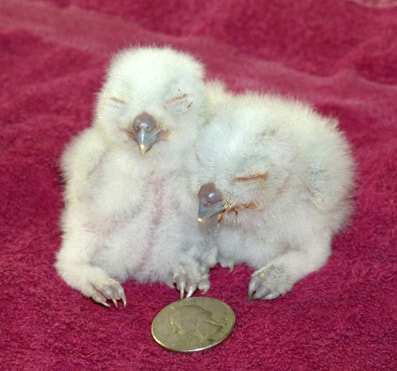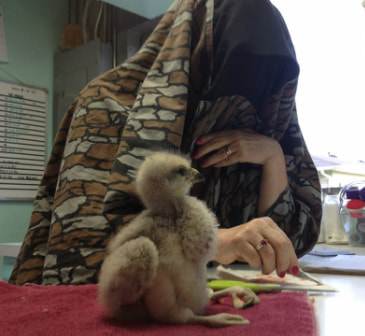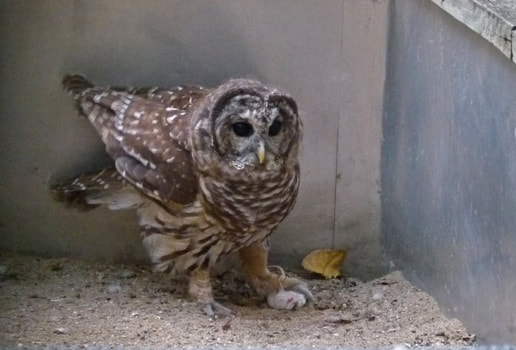WHAT TO DO IF YOU FIND A BABY BIRD
 Eastern Screech Owl Nestlings
Eastern Screech Owl Nestlings
Under the Federal Migratory Bird Treaty Act and State law, it is ILLEGAL for any person to injure or possess an indigenous bird, such as raptors. Raptor Rehabilitation of KY, Inc., is licensed to rehabilitate injured birds by the US Fish and Wildlife Service, and the Kentucky Department of Fish and Wildlife Resources.
An injured bird requires IMMEDIATE specialized care. Any delay reduces the bird's chance for recovery. Most veterinarians do not have the time, special facilities, or the practical experience to handle injured birds.
When birds leave the nest for the first time (fledge), they often do not have full flight capability, and spend two or three weeks on or near the ground, attended by their parents. Please be a responsible pet owner and consider keeping your pet indoors during the sensitive nesting and fledging time.
WHAT TO DO?
If the bird you find is NOT injured:
An injured bird requires IMMEDIATE specialized care. Any delay reduces the bird's chance for recovery. Most veterinarians do not have the time, special facilities, or the practical experience to handle injured birds.
When birds leave the nest for the first time (fledge), they often do not have full flight capability, and spend two or three weeks on or near the ground, attended by their parents. Please be a responsible pet owner and consider keeping your pet indoors during the sensitive nesting and fledging time.
WHAT TO DO?
If the bird you find is NOT injured:
- Be certain the area is free of any animal that can cause harm. Especially, keep cats and dogs away from the nest site.
- If you find a bird on the ground, carefully return it to the nest. It is a MYTH that parents won't care for a baby bird once it has been touched by humans.
- If the original nest is unsafe or destroyed, place the bird in a small basket. Nail the basket to the tree near the nest site, out of direct sunlight. If you can't find a basket, use a margarine dish, but be sure to punch drainage holes in the bottom.
- It is a good idea to keep an eye on the baby bird from a discreet distance. If the parents do not return in an hour, call your local DNR or wildlife rehabilitation center for help.
- Prepare a small cardboard box by punching ventilation holes in the sides and top.
- Gently place the bird on a towel and put the box in a warm, dry, quiet area.
- DO NOT GIVE THE BIRD ANY FOOD OR WATER!
- Call your nearest DNR office or wildlife rehabilitation center.

CHICKS REQUIRE SPECIAL CARE
Do yourself and the chick you find a favor, and do NOT try to raise it yourself. Chicks require special food at different parts of their lives. Do you keep mice in your freezer? We do.
At a young age, these chicks can be imprinted on people who feed them. In other words, the chick thinks it's a person, and does not know how to act like a bird when it grows up. Imprinted birds cannot survive on their own in the wild even though there is nothing physically wrong with them. At RROKI we place young chicks with an adult of the same species to be fostered, avoiding the problem of imprinting them.
Do yourself and the chick you find a favor, and do NOT try to raise it yourself. Chicks require special food at different parts of their lives. Do you keep mice in your freezer? We do.
At a young age, these chicks can be imprinted on people who feed them. In other words, the chick thinks it's a person, and does not know how to act like a bird when it grows up. Imprinted birds cannot survive on their own in the wild even though there is nothing physically wrong with them. At RROKI we place young chicks with an adult of the same species to be fostered, avoiding the problem of imprinting them.
When chicks are old enough to fly and learn to hunt, we give them live mice to practice on before they are released back into the wild. We always try to release a bird in the same area where it was found.


